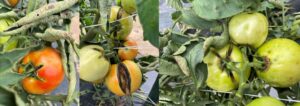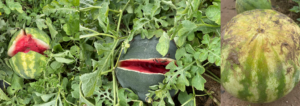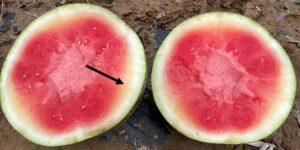We received more than 8 inches of rain since the evening of July 24 at Southwest Purdue Ag Center. This article discusses a few plant physiological disorders we observed after the heavy rains.
We noticed a large percentage of cracked fruit on tomatoes at the stem end (Figure 1). Fruit cracking is a physiological disorder that typically relates to a rapid uptake of water of the fruit. The fast water uptake affects strength and elasticity of the fruit skin and results in cracking. Some are minor damages, while others are severe enough to make fruit unmarketable. Fruit close to maturing are most susceptible to cracking, but it can also happen on immature green tomato fruit. In addition to fruit cracking, we also observed rain-checking on some tomato fruit which might be direct damage by the heavy rains.
On watermelons, the heavy rains resulted in fruit split (Figure 2). Although the symptom happened on some cultivars with a thin rind, not all the thin-rind cultivars are prone to split. The disorder does not seem to be associated with a particular rind pattern or fruit size.
Another fruit disorder I noticed is that a higher percentages of fruit have water-soaked flesh edges after being cut open (Figure 3). The symptom may be associated with fast water updates or elevated stresses affecting fruit ripening.
We saw yellowing and/or necrotic leaf symptoms on watermelons and cantaloupes. Although the rain created ideal conditions for disease spread, some of the symptoms may be caused by direct rain damage, plant response to water stress, or a nutrient deficiency. It is important to separate these symptoms from infectious diseases for appropriate management.


